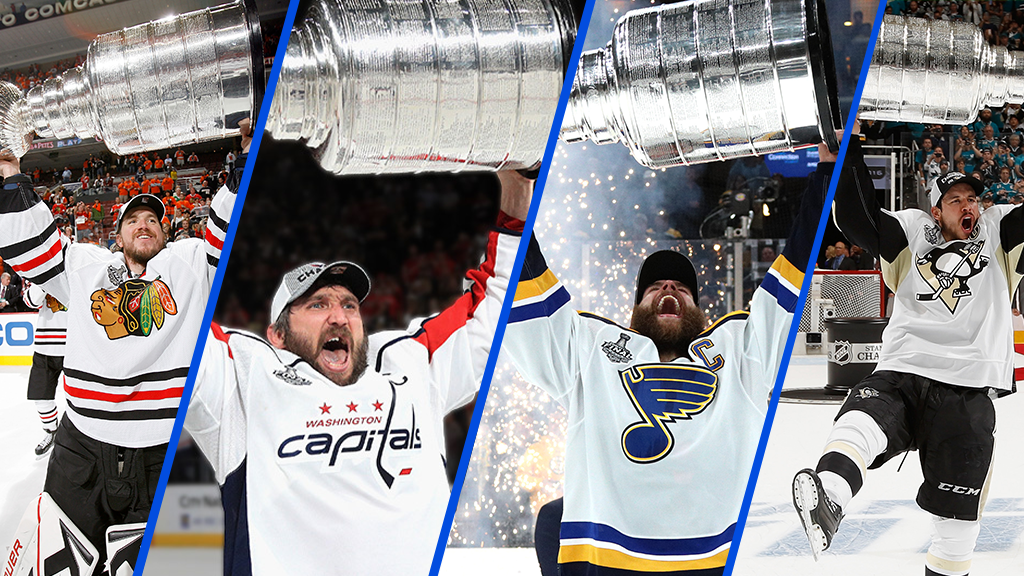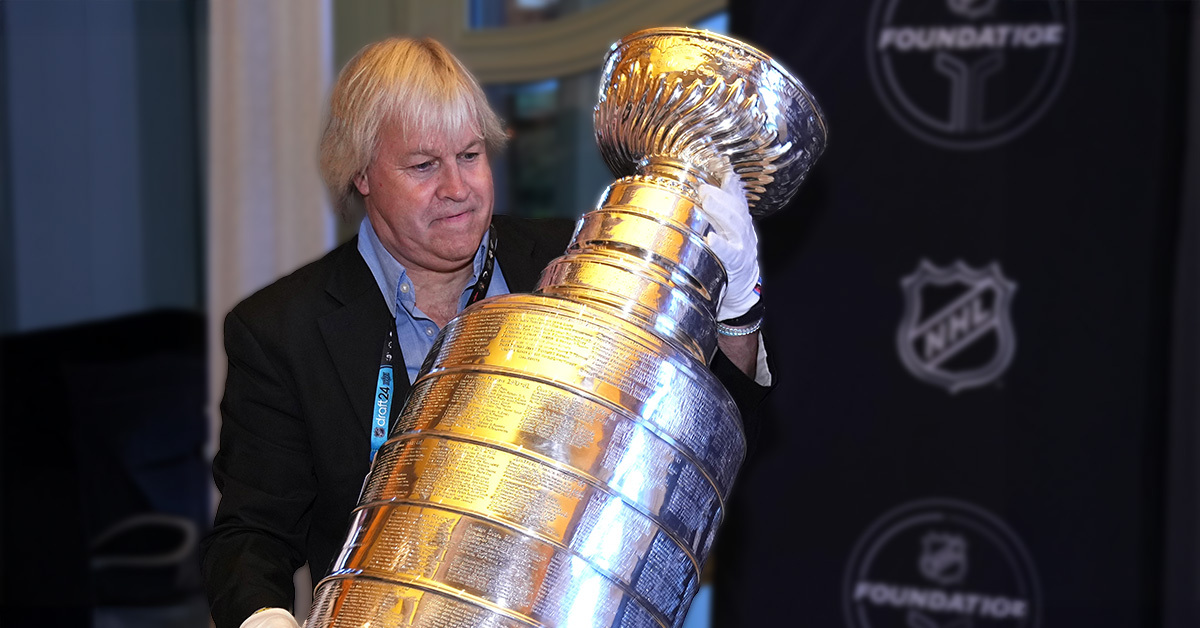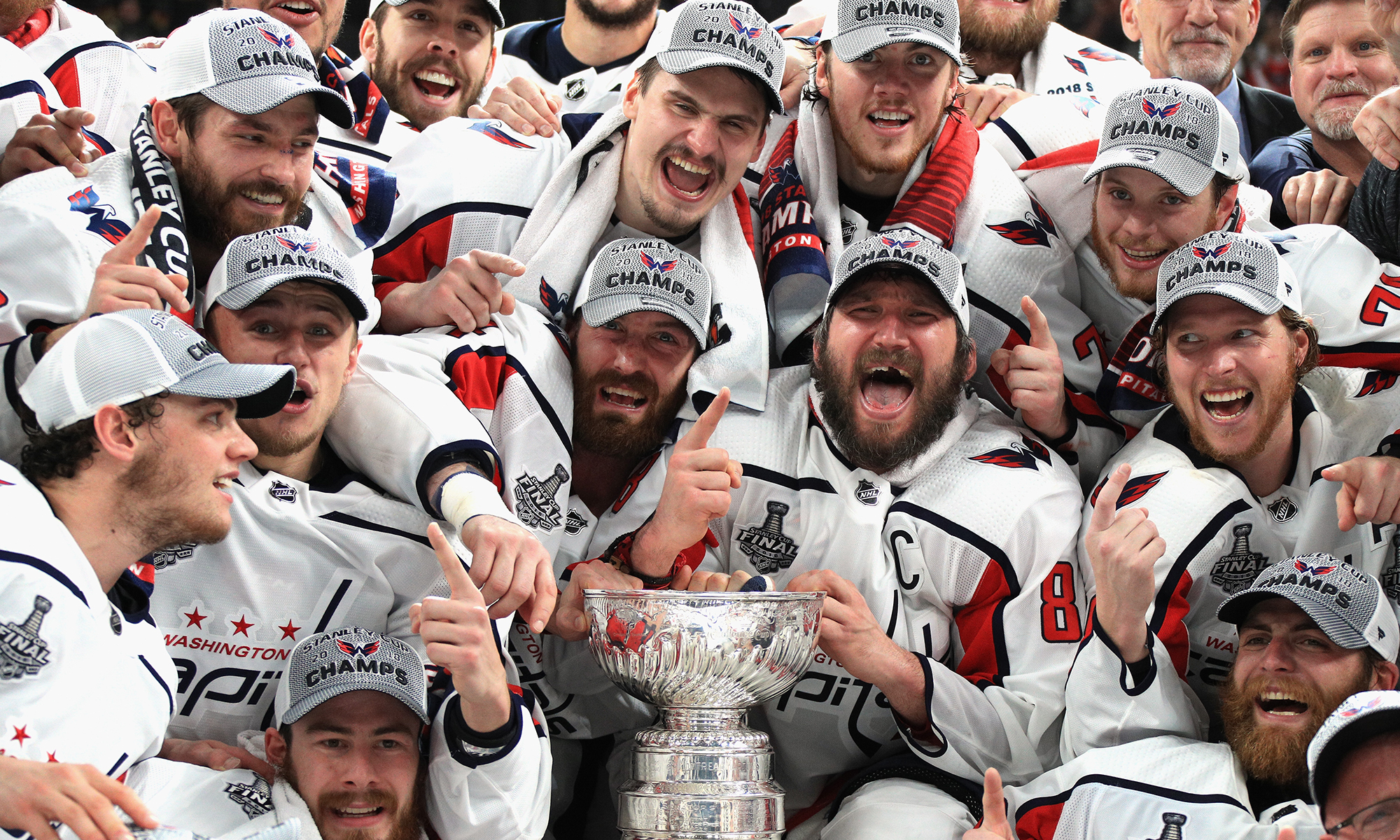
Its reputation precedes it. It’s widely recognized as the greatest trophy in sports, but also one of the most elusive.
The Stanley Cup is a physical token and symbolic icon representing hockey’s mountaintop—the prize awarded at the end of a grueling months-long postseason that often breaks some of the world’s toughest athletes both mentally and physically.
“A silver inanimate object that has a life of its own” is how Hockey Hall of Fame curator Phil Pritchard describes the Stanley Cup to Ticketmaster. “It’s 36 inches high and 37 pounds. It really stands out. And not to take away from any other sport, but it really stands up as the pinnacle of this sport—of the game of hockey.”
Arguably no one on the planet is more qualified to talk about the Stanley Cup and its importance to hockey than Pritchard. As part of his duties for the Hockey Hall of Fame, he has served as Keeper of the Cup since 1988.
Over the past 37 years, wherever the Stanley Cup has gone—arenas, parades, charity events, the personal homes of winners—Pritchard has usually been right there alongside it, acting as equal parts transporter, historian and bodyguard. Avid hockey fans will likely recognize him as the Cup’s primary chaperone—the man with the swooping blonde hair and the white gloves who carries the chalice whenever and wherever it needs to be presented.
Conceivably nobody else alive has spent more time with the Stanley Cup than Pritchard, but he still holds a little bit of envy toward the players that are lucky enough to call it their own—if only for a year at a time.
If you win it, you don’t get to keep it. If you keep it, that means that it’s not really yours.
“I’ve traveled with it and worked with it for 37 years now, but as a kid growing up, I always wanted to play in the National Hockey League, win the Stanley Cup and be like those guys on TV and celebrate with it,” says Pritchard.

With 130-plus years of hockey attached to the Cup (the oldest existing trophy in North American professional sports) there are plenty of incredible stories about how it’s been won. However, there are perhaps just as many—if not more—stories about how those wins have been celebrated. The magic and magnitude of the Stanley Cup championship celebration is something that’s hard to put into words but easy to understand once witnessed.
Players cathartically hoisting the Cup and taking exuberant victory laps after a grueling journey to the top of the sport is top-notch theater just about every time. And when those players press their lips to the trophy, it often signifies lifelong dreams (like Pritchard’s from childhood) being achieved.
But that first hoist and kiss is just the start of the celebration.
A notable feature of the Stanley Cup is that it serves as a legendary and practical instrument for partying, as the bowl atop the trophy can hold 209 glorious liquid ounces (or about 17 standard cans of whatever beverage one desires).
If the Cup could talk, it would be able to share endless party stories that extend far beyond the ice or walls of any arena. Pritchard seems to prefer to let winners tell their own tales of celebratory debauchery—a good Keeper of the Cup also has to keep those tales close to the vest—but some are too good (or too ridiculous) to keep under wraps.
A quick internet search will uncover some of the best known to the public, such as the time the Montreal Canadiens accidentally abandoned it in a roadside snowbank. Or the time the Cup sank to the bottom of Mario Lemieux’s pool and was damaged by chlorine. Or the time(s) Mark Messier brought it to a strip club and watched it be incorporated into a performance on stage.
View this post on Instagram
Pritchard tends to abstain from any sort of celebration himself—he’s never even lifted the Cup over his head, saying he hasn’t “earned the right to do that.” He has only stolen a sip out of the bowl once—during the Cup’s maiden voyage to Russia in 1997, when he reluctantly took a celebratory drink while accompanying Igor Larionov and Slava Fetisov following the Red Wings’ championship.
“It was the first time we went to Russia. And I refused, but they kind of forced me to,” Pritchard remembers. “And it was Russian vodka. Go figure.”
One of the most integral elements of the Stanley Cup’s legend is that almost all of these stories are attached to one singular trophy. There’s a replica version that serves as a stand-in at the Hockey Hall of Fame when the real trophy is on the road (for about 300 days a year) but the Cup awarded to victors is always the same. Its legacy is outright apparent too, as the names of all those who have won throughout years get their name engraved on the Cup’s tiers.
“They make a new Super Bowl [trophy] every year. They make a new World Series trophy. They make a new Larry O’Brien Trophy every year, and that’s their thing, and that’s great,” Pritchard says. “But in hockey, you get to spend time with the Stanley Cup, but it doesn’t become yours. You get your name on it in perpetuity, but you’ve got to play for it again the next season.”
And there’s the elusiveness. Not only is it an incredibly difficult trophy to win due to the nature of NHL’s postseason format, but a win only gets you so much time.
When a team wins the Cup, they get 100 days to spend with it over the summer, with many of those dedicated to personal celebration days for players and franchise staff members. That summerlong tour often involves winners bringing the Cup back to their hometown and sharing the moment with the people who helped shape and mold their origins with the sport. Others have elected to bring the Cup on vacation or sightseeing. To this point, Pritchard has escorted it to 31 different countries across the world (but never Fiji. He wants to go to Fiji.)
Regardless of how or where a winner chooses to celebrate with the Cup, Pritchard has to ensure the trophy is safe and that the day is as special and memorable as possible.
That’s why, in recent years, the NHL and the Hockey Hall of Fame have taken steps to speed up the Cup’s engraving process, ensuring that members of the winning team can see their name on the Cup before the summer of celebration begins. In the past, a delayed engraving might mean that winners didn’t get the chance to see the permanence of their achievement.
“Over the last couple of years we have worked with the Stanley Cup team to get their names engraved on the cup early on in the summer,” explains Pritchard. “The reason we’ve done that is… you might not ever see the Cup again.
“Before any player or staff member has a day with a Cup, we get their name put on. And I think that’s going to be a tradition moving forward, and that’s going to be pretty powerful.”
For any player who grew up with championship aspirations, seeing their name on the Cup can be an emotional moment—not only does it secure their place as a champion at the highest level, but it also helps justify commitment and sacrifices made in the name of the game.
For many others who have shared similar aspirations in the sport, the absence of a name on the Cup can also be powerful. Just as the Stanley Cup can help solidify and ensure the legacy of those who have won it, it can also challenge and question the legacies of those who haven’t.
Many players have tried and failed to win the Cup, even some of the most iconic and talented names that help define a generation in the sport. A player could compile a towering record of personal achievements and records, but if they don’t have their name on the Cup, it will always be a hole in the boat.
Even Alex Ovechkin—who has recently cemented himself as the most prolific goal-scorer in the history of the sport—wasn’t immune from having his greatness questioned as he struggled to win the Stanley Cup over the first 13 years of his career before eventually achieving the goal in 2018. Connor McDavid, who is almost unanimously recognized as the most talented player in the game today, has yet to win one.
View this post on Instagram
Last season, McDavid and his Edmonton Oilers teammates came close… as close as you possibly can while coming up empty-handed, losing in Game 7 of the Stanley Cup Final. Instead, it was the Florida Panthers who got their names engraved and spent the summer with the Cup for the first time in franchise history.
That Cup celebration felt a bit extra cathartic for Florida and its fanbase, who spent much of three decades being treated as a league punching bag both on and off the ice. After 31 years without a Stanley Cup, one win helped shift the Panthers’ identity from “little brother” to “model franchise.”
The Stanley Cup may be an inanimate object, but it certainly does have a life all its own—and it wields a great power over the entire sport of hockey. Pritchard, who has spent the majority of his own life protecting that power and witnessing its pull, believes that whether you’re a player, team or fan, there’s a certain amount of respect that’s due to the most iconic trophy in sports.
“I personally don’t think you should touch it until you’ve actually won it or have earned that right,” says Pritchard. “I know players will not touch it, and a lot of fans won’t touch it until they’ve earned that. But there’s a lot that will, they want to hug it and all that.
“I think you’ve got to earn that. And I think when a city wins it for the first time, I think their fans really realize what it took. And they’re glad they waited.”

Get ready for the Stanley Cup Finals and grab NHL tickets on Ticketmaster. Check out our NHL ticket-buying guide.
Tags
You Might Like
Sports
Score a Beauty: 2025-26 NHL Season FAQs
The 2025-26 NHL season is here, and we’ve put together this guide to make sure you have the info you’ll need to get ready to see your favorite team hit...
Sports
Hockey Talk 101: Popular Hockey Terms & Lingo
Whether you're new to hockey or a lifelong fan of the sport, we’ve put together this guide to help the crowd get caught up on popular hockey slang and lingo.
Sports
NHL Heritage Classic: Series History & What to Know for 2026
Hockey hits the great Canadian outdoors for the NHL Heritage Classic. Starting as the NHL’s first-ever outdoor, regular season game in 2003, the league’s pre...

